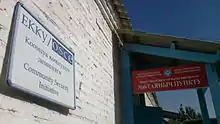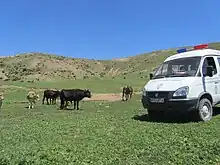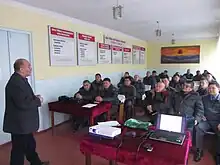Community Security Initiative
The Community Security Initiative (CSI) (Russian: Инициатива общественной безопасности) was a project of the OSCE in Kyrgyzstan that aimed to help the country's police in their activities.[1] The project was established following the 2010 South Kyrgyzstan ethnic clashes.[2] The main objective of the CSI was "to increase the respect for and protection of human rights by the police and to build confidence between law enforcement agencies and communities including through the promotion of multi-ethnic policing."[3]

The CSI was approved in November 2010 by all OSCE participating states. The project was officially ended on 11 December 2015.
History
The Community Security Initiative was developed at the request of the government of Kyrgyzstan and approved by a decision of the OSCE Permanent Council on 18 November 2010. The main goal of the project was to support Kyrgyzstan's police in dealing with the security situation following the 2010 South Kyrgyzstan ethnic clashes and to assist in the police reform process.[4][5] Markus Mueller of Switzerland (2010-2013), Todor Staykov of Bulgaria (2013-2014), Robin Seaword of the UK (2014), and Patrick McNulty of the US (2015) served as head of the CSI. In the fall of 2014, the government of Kyrgyzstan decided to close the CSI project. However, it was extended for another year. The CSI was officially closed on 11 December 2015.[6]
Activities
As part of the project, the OSCE sent unarmed police advisers to several districts across Kyrgyzstan and donated 18[7] mobile police receptions—minivans with basic equipment needed for a mobile police reception—to re-establish and increase police presence in remote areas.[8][9] In 2011–2015, over 80,000 people approached the mobile police receptions.[10]

The CSI project also organized over 150 trainings for police officers to improve their professionalism.[11] In addition, the CSI closely monitored and supported the activities of local crime prevention centers and neighborhood inspectors to increase their efficiency in addressing security issues and everyday concerns of citizens. The CSI also promoted youth empowerment and education by providing opportunities for young people to learn about school bullying and racketeering, as well as ethnic tolerance, career building, and prevention of bad habits.
The project worked in collaboration with the OSCE's Police Reform Programme and High Commissioner on National Minorities (HCNM). The project also collaborated with a large number of national authorities in Kyrgyzstan, including the Ombudsman, Prosecutor General, the State Penitentiary Service, the Ministry of Interior, the Ministry of Justice, and the Ministry of Health.
The CSI received €7 million worth of financing from the European Union and 21 OSCE participating states, including Andorra, Austria, Belgium, Canada, Denmark, Finland, France, Germany, Hungary, Ireland, Kazakhstan, Liechtenstein, Lithuania, Luxembourg, Norway, Sweden, Switzerland, Turkey, the United Kingdom and the United States.[12][13]
Areas of operation

The CSI was present in the following districts and cities across Kyrgyzstan:[14][15][16]
References
- "Several events take place in the south aimed at increasing public trust in the police" (in Russian). Turmush. 27 June 2014. Retrieved 10 July 2014.
- "Kyrgyzstan: The Swiss Government renews its financial support to the Community Security Initiative in the south of Kyrgyzstan". Swiss Cooperation in Central Asia. 17 December 2012. Retrieved 27 May 2014.
- "The Community Security Initiative". OSCE. 12 April 2012. Retrieved 27 May 2014.
- "Official closure of a project by the OSCE Centre in Bishkek". Asia Press (in Russian). 11 December 2015. Retrieved 14 December 2015.
- "Role of community policing in countering radicalization highlighted in new guide by OSCE Community Security Initiative in Kyrgyzstan". OSCE. 31 July 2014. Retrieved 1 August 2014.
- Chykynova, Aizura (11 December 2015). "The Community Security Initiative project ends in Kyrgyzstan". Kyrtag (in Russian). Archived from the original on 22 December 2015. Retrieved 12 December 2015.
- "Deputy Minister of Interior K. Asanov: To assist the police the Community Security Initiative project provided them with 18 Sobols". CA-News (in Russian). 11 December 2015. Retrieved 14 December 2015.
- "OSCE gives the MoI of Kyrgyzstan mobile police reception centers" (in Russian). KirTag. 11 July 2012. Archived from the original on 14 July 2014. Retrieved 10 July 2014.
- Moiseeva, Svetlana (30 June 2014). "Police in the south receive mobile police receptions from the OSCE" (in Russian). Vechernyi Bishkek. Retrieved 10 July 2014.
- "During the past four years, 150 trainings were organized to help the police improve their professionalism". CA-News (in Russian). 11 December 2015. Retrieved 14 December 2015.
- "During the past four years, 150 trainings were organized to help the police improve their professionalism". АКИpress (in Russian). 11 December 2015.
- "S. Kapinos: The total amount of investment in the Comuunity Security Initiative was equal to 7 million euros". CA-News (in Russian). 11 December 2015. Retrieved 14 December 2015.
- "OSCE concludes Community Security Initiative project in Kyrgyzstan". OSCE. 11 December 2015. Retrieved 15 December 2015.
- "CSI areas of operation". OSCE. 13 April 2012. Retrieved 15 December 2015.
- Moiseeva, Svetlana (13 November 2013). "The OSCE tells about the implementation of a project on community security" (in Russian). Vechernyi Bishkek. Retrieved 19 November 2014.
- "OSCE and UNODC organize events in south Kyrgyzstan to improve public confidence in police". OSCE. 30 June 2014. Retrieved 19 November 2014.